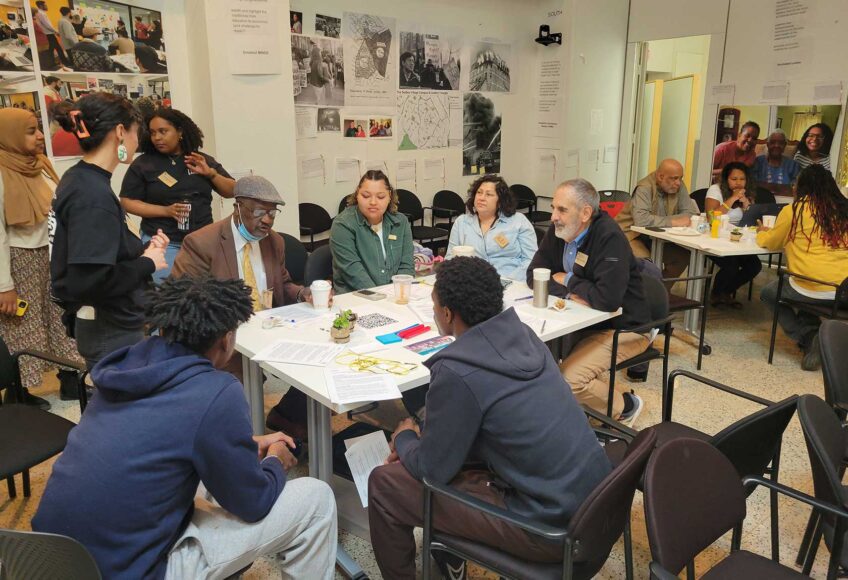
Governor Charlie Baker at an ethnic media roundtable last week sought to assuage concerns that flared up in response to recent policy shifts and proposals affecting immigration and policing. Baker’s announcement last month that state police would be permitted to comply with detainment requests from federal Immigration and Customs Enforcement (ICE) sparked outcry from elected officials and immigration advocacy groups. Also generating worries was a bill he filed to raise assault and battery against a police officer during the line of duty to a felony.
But Baker said communities should not worry: Only those arrested for a criminal violation or on a warrant — not citizens pulled over for minor offenses — are liable to be detained for ICE, and only assault and battery that causes serious harm would qualify as a felony.
On the web
Read the bill: www.scribd.com/doc/316542089/Assault-and-Battery-of-a-Police-Officer-Baker-Filing-Letter
ICE detainments
Many, including Mayor Martin Walsh and the Boston City Council, decried the move to permit state troopers to make detainments for ICE. They argued that the policy could instill fear of law enforcement in immigrant communities, making residents unlikely to seek help when they are in danger or cooperate with investigations.
Baker and Dan Bennett, Secretary of Public Safety, assured reporters that only those being processed as dangerous criminals are eligible to be detained. A state trooper may not ask about immigration status to assess citizenry, they said.
“There will be disciplinary action taken against a state trooper if they go around asking people if they are citizens or not,” Bennett said. To report such misconduct, people may call state police headquarters or constituent services, they said.
Baker also acknowledged a need to build trust with communities over the new policy.
“We’ll tell you exactly how many people have been detained and if we can, we’ll tell you why they’ve been detained,” he said.
In the month since the policy implementation, no one has been detained under it, Baker informed reporters. The governor said he was willing to provide monthly detainment tallies and any information that would not violate the individuals’ privacy.
Bennett and Baker said the state policy was developed from ideas and models from police chiefs and commissioners in 15 large metropolitan areas that appear to comply with ICE detainment requests without estranging residents.
One such model was Chelsea.
However, Gladys Vega, executive director of the Chelsea Collaborative, said the city’s practices do not translate to a state level, because the effectiveness of Chelsea’s model rests on the strong ties many of its officers have to the community and its significant Latino population — something hard to achieve on a statewide scale.
“The model for Chelsea has worked because many of the police officers have been raised in the city of Chelsea, participate in many of our community meetings and are allies of many members of the community,” Vega told the Banner in a phone interview. “The fact that [Gov. Baker] uses the same model we use in Chelsea with state troopers for me is a ridiculous idea because there’s no relationship. You don’t know who the officers are. Many of these [officers] come from the suburbs where they have no experience with people of color [and so] many of them probably profile.”
A&B against police
Baker recently proposed a bill that would designate certain assault and battery (A&B) convictions against police as felonies punishable by a sentence of one to ten years.
Currently, most A&B convictions are misdemeanors, with sentences of up to two and a half years. And A&B against police (or any public official) carries a minimum sentence, meaning it already is punished more severely than the same misdemeanor against civilians.
There is a fear that Baker’s bill will have a negative impact.
According to some civil rights activists, cops who use excessive force often leverage A&B or related charges against the civilian in order to turn the story in the officer’s favor. By increasing the penalties to those convicted, Baker’s move could put recipients of police force in an even more precarious position, they say.
However, in response to Banner questions at the media roundtable discussion last week, Baker said that the language of the bill prevents against misuse. The proposed legislation would apply felony charges only to cases where an officer sustained serious bodily harm, such as broken bones. Other physical contact would remain a misdemeanor.
Baker and Bennett said they understand concerns that assault and battery charges are misused.
“A concern a lot of people have is that police use A&B as a sword against people,” Bennett acknowledged. “[But for a felony] it has to be a broken arm, broken jaw… serious damage. [The charge] can only be used as a shield.”
Incidental contact like pushing or shoving will not receive felony charges, Baker said.
“The common stupid nonsense that goes on with some frequency — that’s a misdemeanor and should be treated as a misdemeanor,” Baker said.
Rahsaan Hall, director of the Racial Justice Program for the ACLU of Massachusetts, said Baker’s proposal to designate serious A&B against an officer as a felony is unnecessary, as aggravated assault and A&B that causes serious bodily injury already are felonies.
“The concern we have is it’s creating a punishment for an offense that already is punished,” Hall told the Banner. “This is an effort to send a message of support for police officers, but the legislature should be creating laws that serve the residents of Massachusetts, not laws that send messages.”
A&B producing serious bodily injury currently is punishable by up to five years in prison; Baker’s proposal would increase the severity of the sentence, when the injured is a police officer, to up to ten years. Baker’s bill also would install a minimum sentence of one year.
Another provision in the bill allows judges to assess the dangerousness of suspects accused of A&B against a police officer when determining whether to hold them pretrial.





